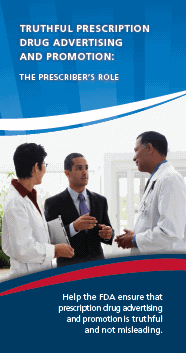Drugs
Truthful Prescription Drug Advertising and Promotion (Bad Ad Program)
The Prescriber's Role – Recognize and Report FDA's educational outreach program is designed to educate healthcare providers about the role they can play in helping the agency make sure that prescription drug advertising and promotion is truthful and not misleading. The "Bad Ad" Program is administered by the agency’s Office of Prescription Drug Promotion in the Center for Drug Evaluation and Research. It will help healthcare providers recognize misleading prescription drug promotion and provide them with an easy way to report this activity to the agency. Content on this Page Bad Ad Program: 2011-2012 Year End Report What You Can Do: Recognize & Report Recognize & Report: Contact Information The Office of Prescription Drug Promotion (OPDP) Mission
* DDI/OPDP - Bad Ads Program Webinar - April 28, 2011 *
|
Bad Ad Program: 2011-2012 Year End Report
Please see the Bad Ad program's 2011-2012 report providing a summary of the program's activities during its second year.
Bad Ad Program: 2011-2012 Year End Report
What You Can Do: Recognize & Report
The prescriber can play an important role in ensuring that prescription drug advertising and promotion is truthful by recognizing and reporting misleading drug advertising and promotion.
Recognize –
Be aware of the many advertisements and promotions that you see every day.
Report –
Help FDA stop violations by reporting activities and messages that you consider false or misleading.
Prescription drug advertising must:
- Be accurate
- Balance the risk and benefit information
- Be consistent with the prescribing information approved by FDA
- Only include information that is supported by strong evidence from clinical studies
What types of promotion does OPDP regulate?
- Sales representative presentations
- Speaker program presentations
- TV and radio advertisements
- All written or printed prescription drug promotional materials
OPDP does not regulate promotion of:
- Over-the-Counter Drugs
- Dietary Supplements
- Medical Devices
Common Violations:
- Omitting or downplaying of risk
- Overstating the effectiveness
- Promoting off-label, or unapproved, uses
- Misleading drug comparisons
Examples of Violations
Example of Omission of Risk
You attend a speaker program which features a slide show that presents efficacy information about Drug X, but no risk information.
This presentation would be misleading because it fails to include a fair balance of benefit and risk information for Drug X.
Example of Unapproved Use
You are in a commercial exhibit hall and a company representative tells you that a drug is effective for a use that is not in the FDA-approved product labeling.
This presentation would be illegal because it promotes an off-label use.
Example of Overstating the Effectiveness
“Doctor Smith, Drug X delivers rapid results in as little as 3 days.”
This presentation is misleading because the majority of patients studied in the clinical trials for Drug X showed results at 12 weeks, with only very few showing results in 3 days.
Frequently Asked Questions
1. Can I report anonymously?
Yes, anonymous complaints often alert FDA to potential problems. However, complaints accompanied by names and contact information are helpful in cases for which FDA needs to follow-up for more information.
2. Will OPDP be able to stop the misleading promotion?
In many cases, yes, especially if evidence is provided. Evidence can include the actual promotional materials or documentation of oral statements made by company representatives.
3. What will happen to my complaint once I have contacted OPDP?
The information you provide will be sent to the Regulatory Review Officer in OPDP responsible for this class of drugs. The reviewer will evaluate it and determine if it may serve as the basis for a potential enforcement action or as valuable information for our ongoing surveillance activities.
4. How do I learn more?
To learn more about OPDP in-service training for large medical group/hospitals or to speak directly with an OPDP Reviewer, call 301-796-1200.
Recognize & Report: Contact Information
The Office of Prescription Drug Promotion (OPDP)
Phone: 877-RX-DDMAC
(877-793-3622)
E-Mail: BadAd@fda.gov
Write: FDA/CDER/OPDP
5901-B Ammendale Rd,
Beltsville, MD 20705-1266
Fax: 301-847-8444
OPDP's Mission
FDA’s Office of Prescription Drug Promotion (OPDP) is responsible for ensuring truthful advertising and promotion of prescription drugs.
Our mission is to…
- Protect the public health by assuring prescription drug information is truthful, balanced, and accurately communicated.
- Guard against false and misleading advertising and promotion through comprehensive surveillance, enforcement, and educational programs.









